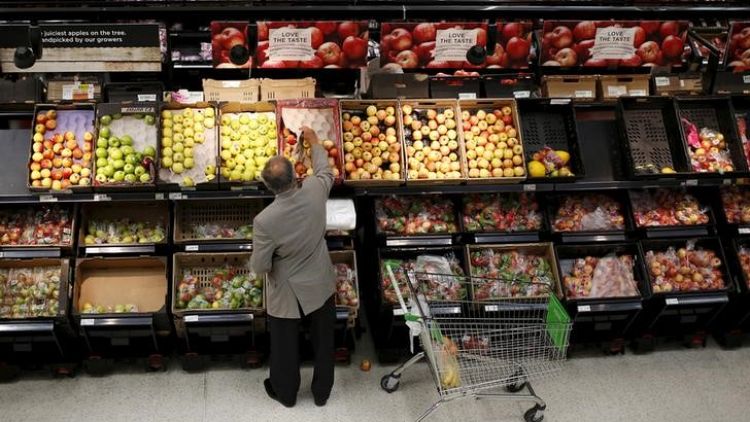By David Milliken and Andy Bruce
LONDON (Reuters) - A free-spending summer by British consumers came to an abrupt end last month with the biggest fall in sales in six months, raising questions about one of the main drivers of the economy ahead of Brexit, official figures showed.
Retail sales volumes in September dropped by 0.8 percent from August - a sharper fall than economists had expected in a Reuters poll - hit by the largest decline in food purchases since October 2015, the Office for National Statistics said.
Annual sales growth slowed to 3.0 percent from 3.4 percent in volume terms, in contrast to the pick-up expected by economists.
But looking at the quarter as a whole, annual growth was still the strongest for a calendar quarter since late 2016.
The joint-hottest summer on record, combined with the World Cup in June and July, encouraged shoppers to splash out on food and drink for barbecues earlier in the quarter.
Britain's economy has slowed since the June 2016 Brexit vote, but consumer spending has remained fairly solid, despite pressure on household disposable income from a spike in inflation since the referendum.
Sterling edged lower against the dollar after the data.
"September's dip in sales reinforces suspicion that consumers may be a bit more restrained in their spending in the near term, at least after their third-quarter splurge - as their purchasing power is still relatively limited," said Howard Archer, economist at consultants EY ITEM Club.
Previously published data from the British Retail Consortium and Barclaycard had already shown households were spending more cautiously last month after their summer spree.
This week provided signs of some respite for households, with underlying pay growth picking up to its fastest since 2009 at 3.1 percent and inflation dropping to 2.4 percent.
"Retail sales continued to grow in the three months to September ... despite a slowdown in food sales following a bumper summer," ONS statistician Rhian Murphy said.
Thursday's data showed a 1.5 percent monthly drop in food sales, spread across both big supermarkets and smaller stores. But sales of household goods such as furniture and electricals saw the biggest annual growth since 2001, boosted by promotions, clearance and online sales.
British retailers themselves have reported mixed fortunes in their most recent earnings reports.
While grocery sales have been robust this year, a shift away from high-street spending towards holidays and entertainment, along with online competition, has taken its toll on clothing and homeware retailers who lack a dominant internet presence.
This week, fashion retailer Superdry <SDRY.L> warned on profit, and department store group John Lewis has reported lacklustre autumn trading.
Online fashion has been the exception with both ASOS <ASOS.L> and Boohoo <BOOH.L> reporting strong trading..
(Editing by Larry King)



